November 2011
by DEREK HELMS
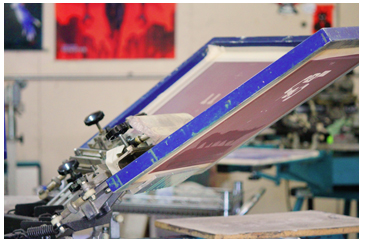 Sean Ingram’s understated office at Blue Collar Press & Distro is quiet and clean. As he sits at his desk sending an email, the bottom of an arm-length tattoo shows under his shirt cuff. Clean cut with black glasses, the tattoo is the only hint of his "other" job: lead vocalist for the influential hardcore band Coalesce.
Sean Ingram’s understated office at Blue Collar Press & Distro is quiet and clean. As he sits at his desk sending an email, the bottom of an arm-length tattoo shows under his shirt cuff. Clean cut with black glasses, the tattoo is the only hint of his "other" job: lead vocalist for the influential hardcore band Coalesce.
Through sweat equity, reinvesting profits and sticking to a punk rock Do-It-Yourself ethos, Ingram has grown a small start-up t-shirt shop into an internationally recognized promotional merchandise business.
Years ago, Ingram’s band, and every other band he knew, had the same problem with merchandise. Either they couldn’t get what the wanted when they needed it, or the quality was so poor they felt they couldn’t sell it to their fans. "Unfortunately, because of the industry we are in, there isn’t always a lot of accountability," Ingram confesses. "Not a lot of guys in punk rock want to keep a 9 to 5 job taking care of inventory, invoices and quality control. I had already been doing that with the wallpaper job."
 Ingram was helping his mom run her wallpaper stripping business in Kansas City. It wasn’t glamorous, but the pay was good and Ingram soaked in business lessons. He knew, however, stripping wallpaper wasn’t going to be his career. In the late 1990’s iMacs had just been released and Ingram was teaching himself graphic design. One night while online, Ingram found a screen press for sale on Ebay. He bought the press for $200 and, with the help of his dad, drove to Denver, picked up the press and headed back to Kansas. He made a few calls to friends and found a spot to plant his press: the basement of Black Lodge Recording Studio on Main Street in Eudora.
Ingram was helping his mom run her wallpaper stripping business in Kansas City. It wasn’t glamorous, but the pay was good and Ingram soaked in business lessons. He knew, however, stripping wallpaper wasn’t going to be his career. In the late 1990’s iMacs had just been released and Ingram was teaching himself graphic design. One night while online, Ingram found a screen press for sale on Ebay. He bought the press for $200 and, with the help of his dad, drove to Denver, picked up the press and headed back to Kansas. He made a few calls to friends and found a spot to plant his press: the basement of Black Lodge Recording Studio on Main Street in Eudora.
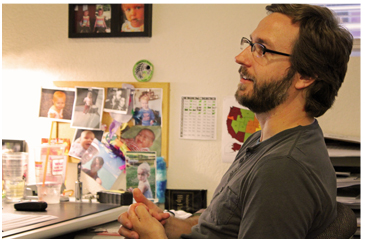 In many circles, Black Lodge Recording Studio is a legendary place. The list of bands and artists that have recorded at the facility reads as a who’s who of local music lore. The Get Up Kids (who’s founding members owned the building), the Appleseed Cast and the Ultimate Fakebook have all recorded in the 150 year-old building. Kurt Cobain recorded with William S. Burroughs at Black Lodge in the ’90s. It seemed like the perfect atmosphere in which to produce t-shirts for bands. According to Ingram, it was, almost, perfect.
In many circles, Black Lodge Recording Studio is a legendary place. The list of bands and artists that have recorded at the facility reads as a who’s who of local music lore. The Get Up Kids (who’s founding members owned the building), the Appleseed Cast and the Ultimate Fakebook have all recorded in the 150 year-old building. Kurt Cobain recorded with William S. Burroughs at Black Lodge in the ’90s. It seemed like the perfect atmosphere in which to produce t-shirts for bands. According to Ingram, it was, almost, perfect.
"I don’t give a damn what anybody says," Ingram says with a defiant smile. "That damn place is haunted. I’m man enough to admit I was scared more than once by the happenings. But, being scared is great motivation for getting your work done. I sure as hell didn’t waste any time. I got in. I got my work done and I got the hell out of there."
The first orders filled were simple. He started by printing shirts for his band. Then friends in a band asked for some t-shirts. The orders were small, manageable and produced very limited, if any, profits.
Ingram lived the DIY and entrepreneurial lifestyle. He continued to work the wallpaper job during the day and would crank out t-shirts orders at night. Time not working the two businesses was spent working with his band.
"I didn’t sleep much those first few years," Ingram says. "Days were spent with wallpaper. I’d clock out, hop in my car and head over to Eudora. I’d print and fill orders at night until the job was done. The next day I’d do it all over again.
It was, really, a pretty simple existence. I knew what I had to do and I got it done."
Ingram’s reputation with the press screen spread like a Kansas grass fire on a windy day. His work ethic, combined with the respect other musicians had for his band, created an easy marketing campaign. Bands from across the country started calling in orders.
"I don’t think I’ve ever made a cold call in my life," Ingram says with a hint of relief. "Since the beginning, all business has come from word-of-mouth and references. To this day we don’t have a sales staff or a single salesperson. I learned very early that if you do what you say you will do, and deliver a quality product when the client wants it, they will tell their friends."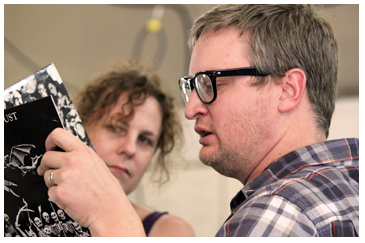
And they did tell their friends. It didn’t take long for the business to grow. With the growth, Ingram had to quit working with his mom. "It was time," he says with a nod. "I was more than tired peeling wallpaper, and the hours and gas were getting to be too much."
Jim David had done contract work with Ingram for a few years and was well versed with both the t-shirt and music industries. David had been touring with his band The Anniversary and, with a partner, operating a boutique t-shirt line called Breakdance America. The music was good, but David was growing tired of partnering in a business he didn’t have daily, hands-on control.
"I sold my shares of Breakdance America," he says. "Right around that time, one of Sean’s silent partners wanted out. Sean and I had been talking about me coming on board with Blue Collar for awhile, but I wasn’t really interested unless there was an option for ownership. Having one of his partners step down opened the door for me."
Burton Parker moved to Lawrence with his band in 2001 and also started doing contract work for Blue Collar. A Wichita-area native, Burton had taught himself graphic design, Photoshop and some computer programming while working at a Kansas City Barnes and Noble. He help develop early forms and sites for Blue Collars’ online capabilities that launched in December of 2002. Parker left the job in Kansas City and signed on as partner in June of 2003.
"It’s not sexy, but it makes money," Parker jokes. "I set up the system that allows us to accept credit card payments online and developed the first individual online stores for bands to sell their products directly to their fans. Most of what I do now is based off that platform."
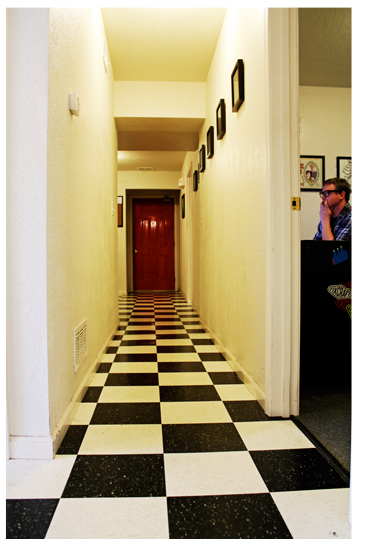 Soon Blue Collar found themselves with 5 employees, multiple presses and occupying a 4,000 square foot warehouse in Eudora. The business was printing merchandise for several well-known national acts and for independent record labels such as Hydra Head, Doghouse and Vagrant. In addition, they were managing their ever-expanding online capabilities. In 2005 the business moved to a warehouse in East Lawrence. Recently the shop relocated to its current location on Delaware Street.
Soon Blue Collar found themselves with 5 employees, multiple presses and occupying a 4,000 square foot warehouse in Eudora. The business was printing merchandise for several well-known national acts and for independent record labels such as Hydra Head, Doghouse and Vagrant. In addition, they were managing their ever-expanding online capabilities. In 2005 the business moved to a warehouse in East Lawrence. Recently the shop relocated to its current location on Delaware Street.
As business has grown, so have services. What was once a guy in a basement with a screen press is now a team of innovative entrepreneurs grabbing a big piece of the independent music merchandise pie. Blue Collar Press has grown to Blue Collar Press & Distro. The company prints shirts, of course, but makes a lot of their hay through distribution models and a thriving online services department.
The platform Parker built is the base for Blue Collar’s online stores. Almost 150 different bands have set up ‘stores’ through Blue Collar that feature their merchandise. The individualized stores highlight t-shirts, posters, bags or even books from the band or record label. The crew at Blue Collar maintains inventory and processes orders, payments and shipping from the Lawrence shop. Bands are able to get real time updates on what is selling and what isn’t. The staff at Blue Collar even model merchandise, when needed.
As founder and president, Ingram is the face of the business. Humble and uncomfortable with adulation, he is quick to spread credit to David, Parker and the staff of Blue Collar. "In the aspect of worrying if things are going to get done, this is a low-stress business. Jim and Burton get the job done and they make sure their departments get the job done."
Ingram deals a lot with billing, individual accounts, record labels and Fixcraft (Blue Collar’s newest revenue stream: manufacturing bike polo equipment). Parker handles online stores and e-commerce ventures while David manages production and, according to both Ingram and Parker, "does everything else." Though roles are roughly defined, roles and responsibilities are often blurred. "We do the job that needs to be done," David says.
"Working with Blue Collar will increase our merchandise profit by 75 percent," beams Portia Sabin, president of Kill Rock Stars Records. "By not having to maintain an offsite warehouse, and worry about staffing and insuring the site, we eliminate so much expense, our profits will undoubtedly increase. Throw in the fact that Blue Collar prints most of the inventory on site, and it is a no brainer for us."
Sabin says Kill Rock Stars had been looking for an outside agency to handle their merchandise. She was asking others in the industry, and nearly everyone she spoke to recommended Blue Collar.
Landing the Kill Rock Stars account was a major win and undertaking for Blue Collar. Their warehouse now features rows of empty shelves in anticipation of KRS merchandise. The label is one of the most respected independent labels in the industry, and earning their business is a badge of honor for Blue Collar.
"I think they are working on a monopoly," Sabin jokes. "Everyone I talked to said ‘Talk to the guys at Blue Collar.’ So, I did. After our initial conversation, it was clear we would be able to work together. We’ve been around for 20 years, so we come with a lot of product. Blue Collar is working with us to set up great online stores for our bands and our label. They’ve already had really great ideas on the most cost-effective way to transfer our pre-existing inventory to their warehouse in Lawrence. And they are nice guys. That goes a long way in this industry. I am really so excited to be working with them."
 The fact that almost everyone at Blue Collar is, or was, in a band lends credibility. "I think it does help them understand what the artists are doing," Sabin says. "Because they’ve been in the position, they’ve been on tour; they know that the bands aren’t always planning ahead with their merchandise orders. It’s great to get that call from them saying ‘hey, so and so band is low on a certain t-shirt, should we ship some to their next tour stop?’ Their insight is great."
The fact that almost everyone at Blue Collar is, or was, in a band lends credibility. "I think it does help them understand what the artists are doing," Sabin says. "Because they’ve been in the position, they’ve been on tour; they know that the bands aren’t always planning ahead with their merchandise orders. It’s great to get that call from them saying ‘hey, so and so band is low on a certain t-shirt, should we ship some to their next tour stop?’ Their insight is great."
Nobody in the office wears a tie, or even dress pants. T-shirts, jeans and Vans is the understood dress code. Music plays and laughter abounds in the warehouse. It’s clear the people who work at Blue Collar do it because they want to. Almost everyone who works at Blue Collar is either a musician, or loves music, and helping independent bands and artists remains an important part of what they do. In fact, bands have been known to crash on the office floors after they play shows at local clubs.
The crew at Blue Collar understands that a personal connection to each artist is important. The office most often deals with a band’s manager with some being more hands-on than others. "It’s a crap shoot," Ingram says. "Some managers call 3 or 4 times a week to check inventory and billing. Other bands we won’t hear from for weeks or months at a time.
Darius Zelkha of Tough Love Artist Management thinks of Blue Collar Press as part of his team. Zelkha manages Josh Ritter, a rising singer-songwriter and author.
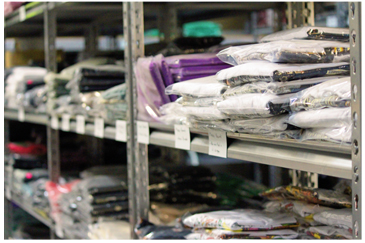 "Josh and I are both pretty particular when it comes to the merchandise we offer fans," Zelkha says. "It’s important to us to have a personal relationship with our vendors, and working with Blue Collar has been effortless. Their rates are good. They do what they say they will do. They return calls with answers. What we really like is how proactive they are. I get calls from Burton with suggestions on products and orders and distribution ideas. They really take what works for other artists and help us mold it for our model."
"Josh and I are both pretty particular when it comes to the merchandise we offer fans," Zelkha says. "It’s important to us to have a personal relationship with our vendors, and working with Blue Collar has been effortless. Their rates are good. They do what they say they will do. They return calls with answers. What we really like is how proactive they are. I get calls from Burton with suggestions on products and orders and distribution ideas. They really take what works for other artists and help us mold it for our model."
Though known nationally for their work with musicians and artists, Ingram wants people to know they are thrilled to work with local businesses. "Yeah, we work with hardcore death metal bands," he jokes. "But we also like making shirts, coffee mugs and promotional garb for Lawrence accountants."
No longer a DIY project in a friend’s basement, Ingram is happy with the business, but sometimes longs for the past. Gone are the days of him and the press, pumping out orders for his friends. Blue Collar Press and Distro has 19 full-time employees and one part-timer. Ingram never imagined running a business this large. He’s not complaining, but it took some getting used to.
"At some point, you have to become comfortable with feeding the beast," he says with a very matter-of-fact tone. "We need to find revenue streams and new products that help our business grow. Sure, sometimes I think it would be fun to go back to just making a few dozen shirts for my friends’ bands, but we have employees that depend on us to provide health insurance and mortgage payments. If we close up shop tomorrow, what are they going to do? How am I going to feed my family? I do it by making t-shirts for some of my favorite bands. I have the coolest job."

30 Comments
peut on acheter du cialis en pharmacie sans ordonnance: Pharmacie Express – comment avoir une ordonnance en ligne
I think this is a real great article. Will read on…
https://pharmacieexpress.shop/# tramadol sans ordonnance pharmacie
farmacia online mascherina Farmacia Subito sconto farmacia online
tobral crema: dicloreum 150 mg compresse – sonirem gocce senza ricetta
donde comprar ansioliticos sin receta: farmacia spagna online – farmacia online en gijon
a derma epitheliale vitamine c pharmacie sans ordonnance viagra commande
se puede comprar el anillo anticonceptivo sin receta: curso auxiliar farmacia online – fluconazol se puede comprar sin receta mГ©dica
fresno apartments for rent rentberry scam ico 30m$ raised mckinney square apartments
Post writing is also a excitement, if you be familiar with afterward you can write or else it is complicated to write.
peut on acheter des somnifГЁre sans ordonnance en pharmacie Pharmacie Express kelual ds shampoing
Pretty nice post. I just stumbled upon your blog and wished to say that I’ve really enjoyed surfing around your blog posts. In any case I’ll be subscribing to your feed and I hope you write again soon!
soldesam 8 mg: zoely prezzo 1 blister – dubine crema
Very neat post. Fantastic.
I think this is a real great blog post.Thanks Again. Fantastic.
Thanks for every other excellent article. Theplace else may anyone get that kind of information in sucha perfect way of writing? I’ve a presentation next week, and I am at the lookfor such info.
It’s difficult to find knowledgeable people for this topic, however, you seem like you know what you’re talking about!Thanks
https://pharmacieexpress.com/# medicament pour perdre du poids sur ordonnance
farmacia pablos mompГa | farmacia y parafarmacia online: como comprar en farmacia online – farmacia online mГЎs barata
Great info. Lucky me I recently found your blog byy chance (stumbleupon).I have book-marked it for later!
farmacia online zaragoza: Confia Pharma – mi otra farmacia online
Hey, thanks for the blog article.Really thank you! Fantastic.
sinusite traitement sans ordonnance acheter viagra en pharmacie sans ordonnance stimulant puissant pour homme en pharmacie sans ordonnance
I am so grateful for your blog article.Much thanks again. Great.
I loved your article.Thanks Again. Want more.
RenBridge
I enjoy what you guys are usually up too. This kind of clever work and coverage!Keep up the fantastic works guys I’ve incorporated you guys to my blogroll.
donde comprar clamoxyl sin receta: se puede comprar orlistat sin receta – farmacia de manipulação online
tobradex se puede comprar sin receta: se puede comprar flutox sin receta – farmacia del ahorro online
avene creme lavante Pharmacie Express minoxidil 5 sans ordonnance pharmacie